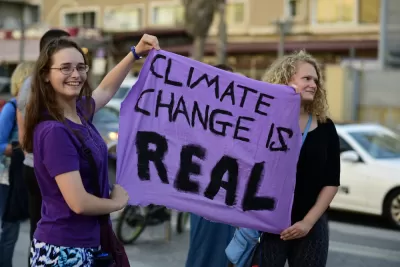If policymakers don't take clear, immediate action, emissions reductions will fall short of the 50-52 percent goal set in Paris.

In an analysis from Rhodium Group, authors John Larsen, Ben King, Emily Wimberger, Hannah Pitt, Hannah Kolus, Alfredo Rivera, Naveen Dasari, Claire Jahns, Kate Larsen, and Whitney Herndon combine their collective expertise "of the US economy, energy systems, and policy design with state-of-the-art modeling tools to comprehensively answer two questions: Can the US cut net GHG emissions by 50-52% by 2030 and if so, what does a policy pathway to the target look like?"
The report finds that "[u]nder current policy as of May 2021, with no new action, the US is on track to reduce GHG emissions 17-25% below 2005 levels in 2030." This "leaves a gap of 1.7-2.3 billion metric tons of emission reductions required to achieve the US target in 2030." The "analysis demonstrates that meeting the US’s 2030 target is achievable, if Congress, the executive branch, and subnational leaders all take a series of practical and feasible policy actions" that include "passage this year of the infrastructure bill and budget reconciliation package in Congress, coupled with a steady stream of standards and regulations by federal agencies and accelerated action by leading states and companies."
The report warns that "[e]ven then, achieving the ambitious goal puts the nation just halfway to the longer-term goal of net-zero emissions by mid-century, which is the level required for the US to play its role in a robust global response to the threat of climate change." The full report, which details "a series of actions that can be reasonably expected to occur over the next nine years if leaders in all levels of government work in earnest to address climate change," can be accessed here.
FULL STORY: Pathways to Paris: A Policy Assessment of the 2030 US Climate Target

Alabama: Trump Terminates Settlements for Black Communities Harmed By Raw Sewage
Trump deemed the landmark civil rights agreement “illegal DEI and environmental justice policy.”

Study: Maui’s Plan to Convert Vacation Rentals to Long-Term Housing Could Cause Nearly $1 Billion Economic Loss
The plan would reduce visitor accommodation by 25% resulting in 1,900 jobs lost.

Planetizen Federal Action Tracker
A weekly monitor of how Trump’s orders and actions are impacting planners and planning in America.

Wind Energy on the Rise Despite Federal Policy Reversal
The Trump administration is revoking federal support for renewable energy, but demand for new projects continues unabated.

Passengers Flock to Caltrain After Electrification
The new electric trains are running faster and more reliably, leading to strong ridership growth on the Bay Area rail system.

Texas Churches Rally Behind ‘Yes in God’s Back Yard’ Legislation
Religious leaders want the state to reduce zoning regulations to streamline leasing church-owned land to housing developers.
Urban Design for Planners 1: Software Tools
This six-course series explores essential urban design concepts using open source software and equips planners with the tools they need to participate fully in the urban design process.
Planning for Universal Design
Learn the tools for implementing Universal Design in planning regulations.
Caltrans
Smith Gee Studio
Institute for Housing and Urban Development Studies (IHS)
City of Grandview
Harvard GSD Executive Education
Toledo-Lucas County Plan Commissions
Salt Lake City
NYU Wagner Graduate School of Public Service





























